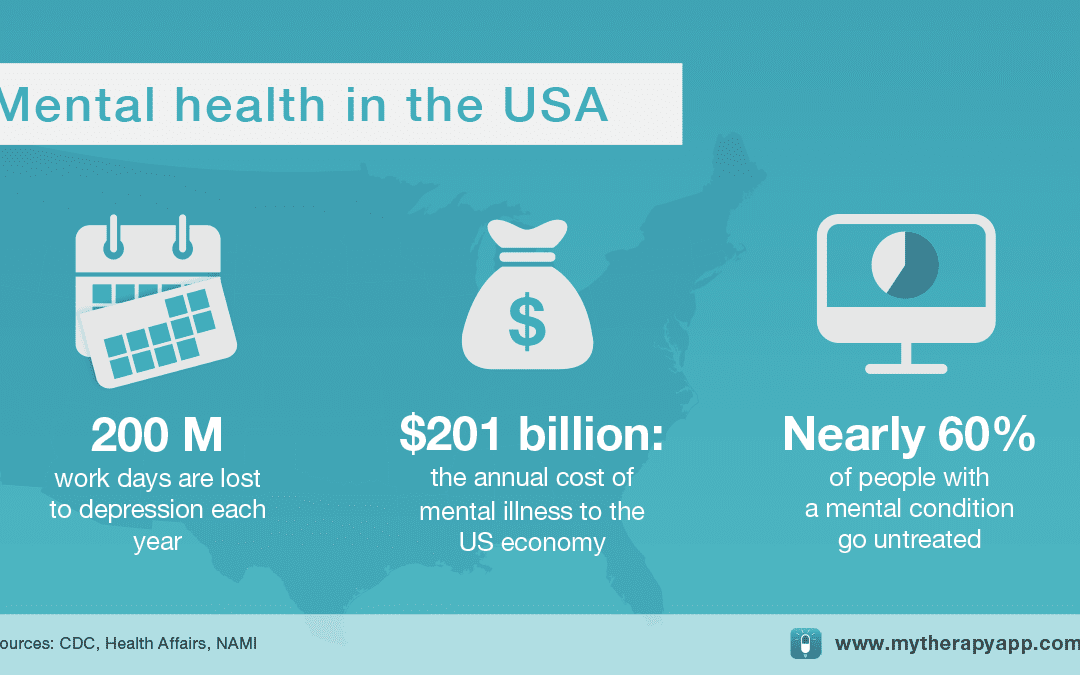By: Abigail Abraira-Burklin
The theme of this year’s World Mental Health Day earlier this month was mental health in the workplace. Addressing this topic is hugely important in allowing people with mental health conditions to have the confidence in seeking the help they need, while still fulfilling their role as an employee. Companies that help their employees successfully strike this balance can expect a happier, healthier workforce, which is in turn more productive and thus better equipped to help the company thrive.
The Figures
An estimated 44.7 million adults in the USA lived with a mental illness in 2016, 10.4 million of whom had a severe mental illness such as bipolar disorder. Such prevalence of mental health conditions is naturally going to have a wide-ranging impact on the workplace and economy. Not only is the cost of treatment estimated to be around $201 billion, but loss of earning is estimated to be roughly $193 billion.
However, considering nearly 60% of people with a mental condition go untreated, both of these figures exclude the cost of reduced productivity in those who remain at work, despite being unwell. The impact of this phenomenon, called ‘presenteeism,’ is harder to quantify, but a 2015 report estimates an average of 57.5 work days are lost per year, per employee. Compare that to the average number of days lost per employee to absenteeism, 4, and it’s clear that presenteeism is a very real issue that companies cannot continue to ignore.
Why does this happen?
As I’m sure you know, laws are in place to protect those with mental illnesses. The Americans with Disabilities Act (ADA) and Equal Employment Opportunities Act are designed to ensure employers do not discriminate against those with mental health conditions, and make reasonable adjustments to working conditions. The unfortunate reality, however, is that not all employers respect these acts, and making a legal challenge can be expensive, time-consuming, and stressful for an employee who believes they have been wronged. Not only that, it can be extremely difficult to prove your case.
For these acts to be binding, an employee must also disclose their condition to their employer. For many, this is something they are simply not comfortable doing, for the stigma associated with mental health conditions is still prevalent in the workplace. Many are justifiably concerned that their colleagues will start treating them differently upon learning of such conditions, and that they may become defined by their illness.
These two factors are key in causing presenteeism. Unfortunately, it means many people simply do not receive the help they need, and suffer in silence at work.
I’m not sure whether to tell my boss
Personally, I have been fortunate enough to work in places that have been sensitive and receptive to both mental and physical health conditions. Even in such companies, colleagues have not always been quite so understanding, which can create a hostile environment that makes people feel as though they have to leave their mental health at the door when they clock in. Unfortunately, doing so does little to tackle the issue.
In deciding whether you should inform your employer, it’s worth considering whether you will be able to perform the critical functions of your job with reasonable accommodation. If you can, this puts you in a much stronger position when talking to your boss. You’ve done the hard work, and you can make a clear and concise argument why it will be beneficial to the company to make such accommodations.
While it can be difficult to take such a step ‘for the greater good,’ the more people that are forthcoming about their condition, the more employers will realize the need to re-evaluate their stance on handling mental health.
A changing culture
The aforementioned report from 2015 also found that employers who took a head-on approach to mental health conditions saw tangible results, recovering 10 days of ‘lost time.’ Such companies are proactive in encouraging employees to be open and forthcoming about their mental health, and also educate its employees about mental health. In such companies, these steps help tackle the negative stigma that still exists in many workplaces. This can go a long way in creating an environment in which people feel comfortable being open about their mental health, and reduce the concern regarding colleagues.
While such a change will not happen overnight, hopefully this year’s World Mental Health Day will help play some small part in this change, giving more people with severe mental health conditions, such as bipolar, the confidence to seek the help they require. This infographic was produced by MyTherapy (available for iOS and Android).


